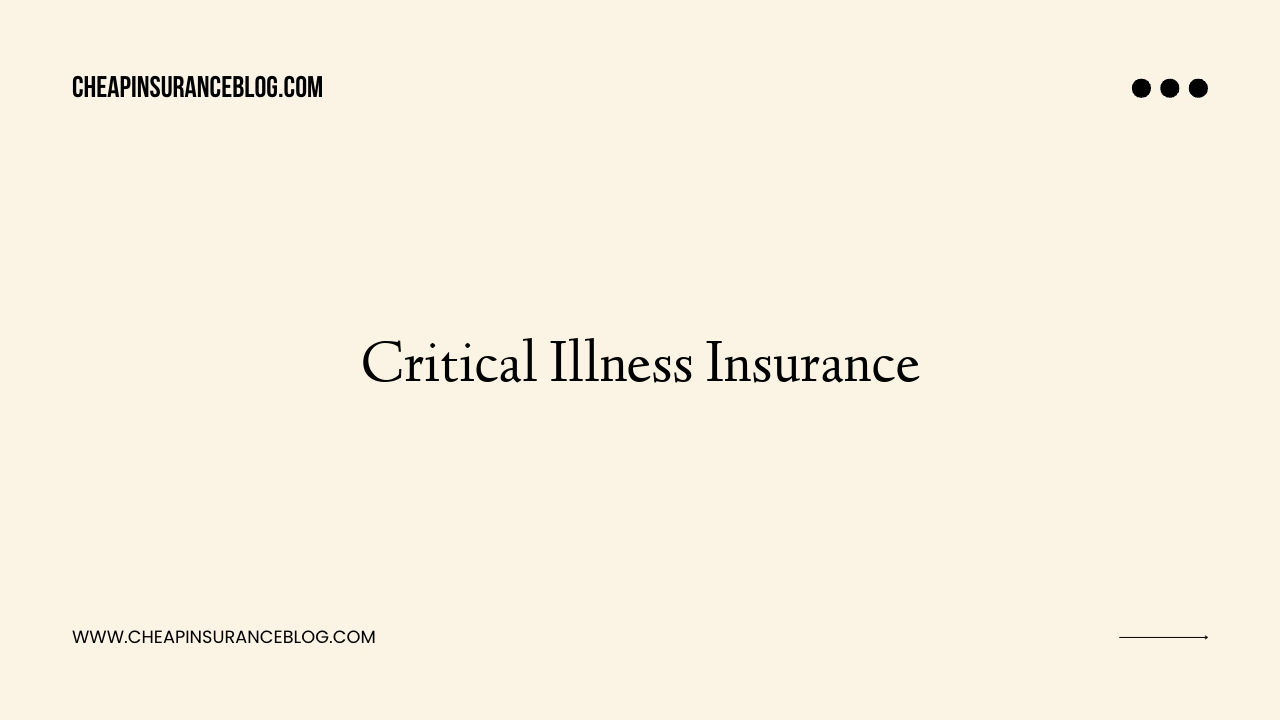Critical illness insurance is a type of insurance policy that provides financial coverage against critical illness. Mainly it includes cancer, heart attack, or stroke. Here are the key features and benefits of critical illness insurance.
What is Critical Illness Insurance
Critical illness insurance is a type of insurance policy that provides a lump-sum payment to the policyholder upon diagnosing a specific critical illness. The payment is intended to help cover the costs of medical treatment and other expenses that may arise due to a serious illness, such as cancer, heart attack, or stroke. It can also help to replace lost income if the policyholder cannot work due to illness.
Critical illness insurance policies typically cover a specific list of illnesses. Here the policyholder must survive a certain period (usually 30 days) after the diagnosis of the covered illness to receive the benefit. The policy may also have exclusions, meaning it does not cover certain conditions or circumstances.
Similarly, Critical illness insurance is designed to provide financial protection to policyholders in the event of a serious illness. Additionally, It can help alleviate the financial burden of medical expenses allowing the policyholder to focus on their recovery.
What is covered under a critical illness policy?
What Does Critical Illness Insurance Provide for Assistance?
Critical illness insurance policies cover a specific list of illnesses, such as cancer, major organ transplant, and other life-threatening conditions.
In addition to covering the medical costs associated with the treatment of a covered critical illness, a critical illness insurance policy may also provide financial assistance for other expenses that may arise as a result of the illness, such as:
Loss of income: If the policyholder cannot work due to their illness, the policy may provide a benefit to help replace lost income.
Travel expenses: Some policies may cover travel costs and medical treatment accommodation.
Home care: If the policyholder requires home care or home modification due to their illness, the policy may provide a benefit to cover these expenses.
Childcare: If the policyholder requires childcare due to their illness, the policy may provide a benefit to cover these expenses.
What are the 30 critical illnesses Covered in the Critical Illness Insurance Policy?
The list of covered critical illnesses under a critical illness insurance policy will vary depending on the policy. However, here is a list of some common critical illnesses that IT may cover under a critical illness insurance policy:
- Cancer
- Heart attack
- Stroke
- Coronary artery bypass surgery
- Kidney failure
- Major organ transplant
- Multiple sclerosis
- Parkinson’s disease
- Alzheimer’s disease
- Aorta surgery
- Aplastic anemia
- Benign brain tumor
- Bacterial meningitis
- Blindness
- Coma
- Deafness
- Heart valve surgery
- Motor neuron disease
- Loss of independent existence
- Major burns
- Loss of limbs
- Loss of speech
- Paralysis
- Schizophrenia
- Systemic lupus erythematosus
- Terminal illness
- Third degree burns
- Traumatic brain injury
- Cardiomyopathy
- Encephalitis
Disadvantages of Critical Illness Insurance
Although Critical illness insurance can provide peace of mind to policyholders in the event of a serious illness, there are also some potential disadvantages to consider:
- Cost: Critical illness insurance policies may be more expensive than other types, such as term life insurance.
- Limited coverage: Critical illness insurance policies generally only cover a specific list of illnesses and may exclude certain conditions or circumstances.
- Exclusions: Some critical illness insurance policies may exclude coverage for pre-existing conditions or may have other exclusions that could limit the policy’s coverage.
- Claim denials: There is a risk that a critical illness insurance claim could be denied if the policyholder does not meet the eligibility requirements.
- Complexity: Critical illness insurance policies can be complex, with different terms and conditions that may be difficult to understand.
- Limited payout: Some critical illness insurance policies may have a limited payout, meaning that the policy will only pay out a certain amount regardless of the actual costs of the policyholder’s medical treatment.
How to Claim Critical Illness Cover
Notify the insurance company: The policyholder must notify the insurance company immediately after being diagnosed with a covered critical illness.
Complete the claim form: The policyholder should fill out the form as completely and accurately as possible and return it to the insurance company along with any required documentation.
Provide additional documentation: The policyholder should provide additional documentation, such as medical records or proof of loss, as soon as possible to expedite the claims process.
Wait for the claim to be reviewed: The insurance company will review the claim and any supporting documentation to determine whether the policyholder is eligible for the benefit. This process may take some time, depending on the complexity of the claim.
Receive the benefit: If the claim is approved, the insurance company will pay the policyholder the agreed-upon benefit. The benefit may be paid in lump sum or installments, depending on the policy terms and conditions.
What are the critical illness insurance pre-existing conditions
Some critical illness insurance policies may exclude coverage for pre-existing conditions. Others may offer limited coverage or require a waiting period before coverage becomes effective.
It’s important to carefully review the policy terms and conditions and to disclose any pre-existing medical conditions to the insurance company when applying for a critical illness insurance policy. Please disclose a pre-existing condition to avoid the policy being voided or denying the claim.
FAQ
Is it good to have critical illness insurance?
Yes, it’s good to have critical illness insurance because it helps cover the costs of medical treatment and other expenses that may arise due to a critical illness. It covers financial risks such as cancer, heart attack, stroke, etc.
How many times can you claim critical illness?
You can claim critical illnesses once for each covered critical illness.s
What is the waiting period for critical illness?
Ranging from 30-90 days, the waiting period for critical illness is decided.
